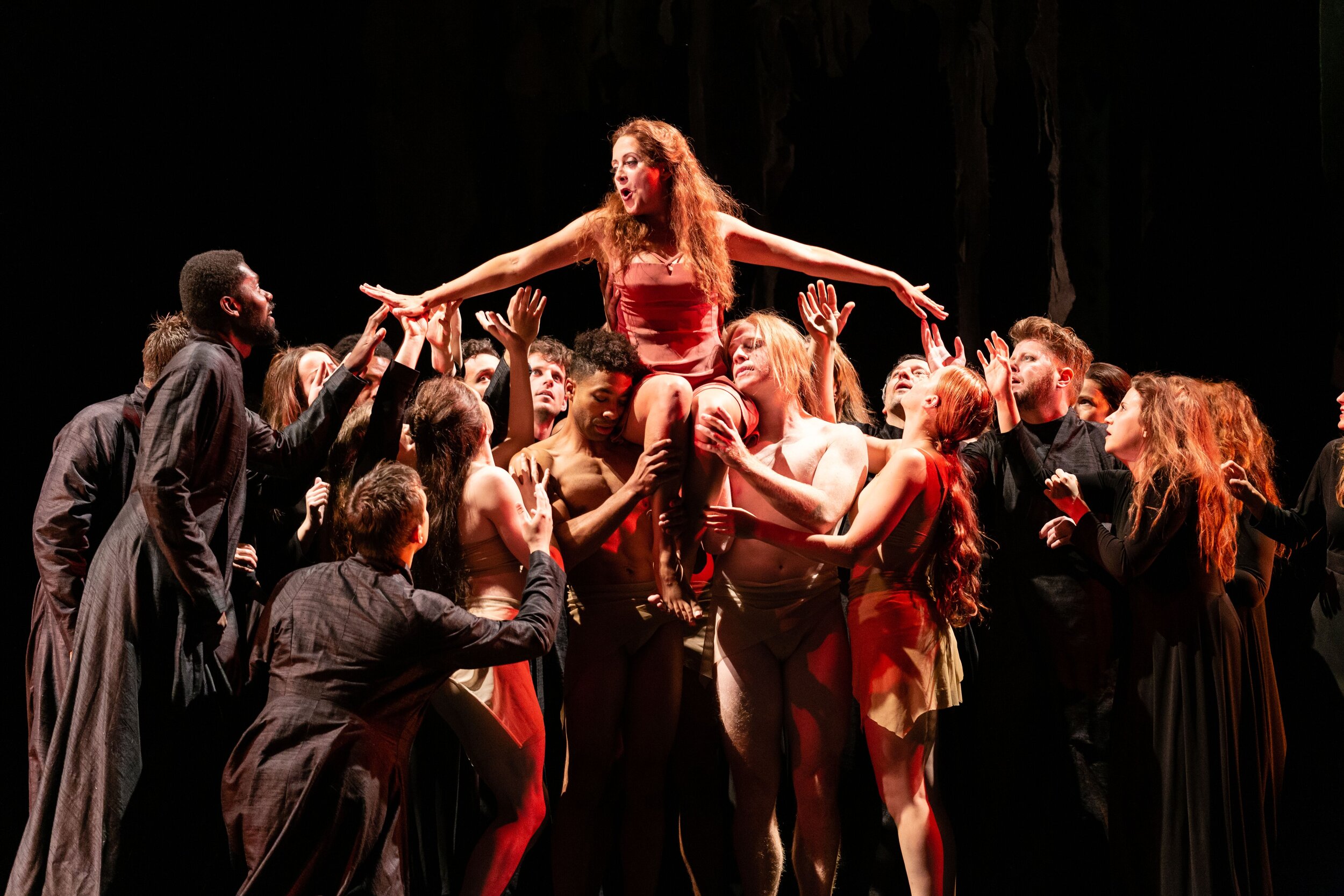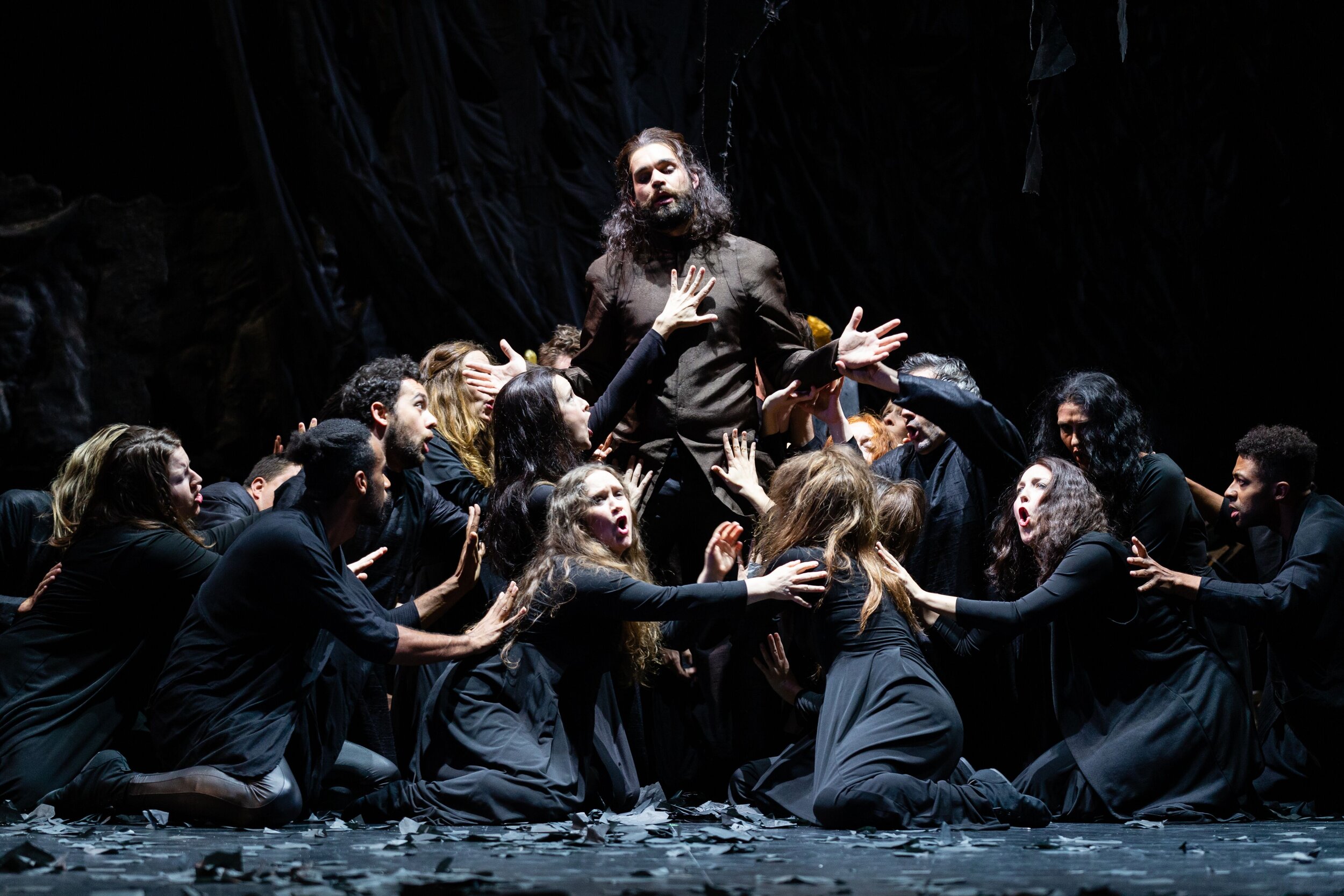And Juno is not happy. However, if you attend this brilliant production of George Frideric Handel’s Semele (1744), you will be. If all you need to know is whether it is worth seeing, the answer is yes. It offers a fresh take on baroque opera with an extraordinary cast and the entertainment value of this production hits the top of the scale. It is a don’t miss component of Opera Philadelphia’s Festival O19 with its theme of rarely presented works. This production with this cast is worthy of having a run across the country.
Amanda Forsythe as Semele. Photo by Dominic M. Mercier; courtesy of Opera Philadelphia.
After just witnessing two husbands (in Il Tabarro and Cavalleria Rusticana) polish off their rivals who are messing with their wives, I saw on Thursday night a woman do the honors to her husband’s lover. The guys were violent and the woman a clever god, but jealousy, that green-eyed monster, drives both gods and mortals to exhibit lethality. Semele is a character in Greek mythology mirrored here in the Roman version. She turns down a chance to marry a prince and make her father the King happy and everybody in the cult lead a nice, tranquil life. Instead she runs away with the most powerful god, Jupiter. Jupiter has a wife, Juno, who learns of his affair. She sets about a plot to use Semele’s desire to become immortal against her. Through her intrigue Juno pushes Semele to extract a promise from Jupiter to give her anything she wants. Semele’s wish is to see Jupiter as a god instead of in human form, hoping she will become immortal. Semele comes to realize too late that viewing gods in their divine form is fatal to humans. She bursts into flame; hubris is punished, and the normal order is restored. Juno is happy, Semele not so much. That is the way it works with gods and mortals: both sin, but only the humans pay.
Tim Mead as Athamas, Daniela Mack as Ino and Lindsey Matheis as principal dancer. Photo by Dominic M. Mercier; courtesy of Opera Philadelphia.
The libretto for Semele is derived from a drama written thirty years earlier as an opera by poet William Congreve, which itself was based on Ovid’s Metamorphoses. Congreve’s poetry adds to the arts experience of attending the opera. Handel composed Semele, a three-hour opera, in about a month’s time; after listening to the music you will find this impossible to believe. Congreve and Handel’s drafter for the libretto intended it to be performed as an opera, but oratorios were what was selling at that period in London, and Handel designated it be performed in “the manner of an oratorio”. If that was his strategy, it did not work. The opera has been performed both ways but was largely ignored altogether after its introduction in 1744 and even today is not often staged, thus fitting O19’s theme. Handel’s use of a secular story centering on a sexual theme was not welcomed in its day, not evidently a problem for modern day Philadelphia – Handel has got his sexy back. Opera Philadelphia’s production based on the 2016 Opera Omaha production of Director James Darrah is a company premiere; Mr. Darrah has revised and added to the 2016 version for OP’s festival. Kudos to him for a marvelous staging.
Daniela Mack as Juno, Sarah Shafer as Iris, and Alex Rosen as Somnus. Photo by Dominic M. Mercier; courtesy of Opera Philadelphia.
I tend to think of even Handel’s Italian operas as mainly vehicles for outstanding singers to have great arias to sing, so I had wondered how Semele would be staged and whether it would be engaging for three full hours. Well, the singers in this production don’t just stand around singing with some acting thrown in. Dance is used heavily for both the singers and chorus to convey emotion, mood, and movement. Sad at times, funny at times, the choreography is enormously effective at drawing the audience into this surreal world and making us care about both gods and mortals. Mr. Darrah made one very clever use of dance. Semele’s sister Ino is in love with the prince Athamas that Semele is supposed to marry. Ino is rather reserved and Darrah uses a dancer Lindsey Matheis to portray Ino’s feeling-self throughout the opera; when Juno appears to Semele in human form, impersonating Ino, it is the dancer she manipulates to influence Semele. The staging is further augmented by set design, costumes, and lighting. The opening set in dark colors and ragged scenery for a cult-like group convey the rigid social order of Semele’s existence and thus the audacity of her relationship with Jupiter. The cosumes draw a clear distinction between mortals and gods; kudos to Costume Designer Sarah Schuessler. The use of curtain panels played a significant role in providing a surface for lighting effects and a dramatic moment, dropping one by one from the ceiling; kudos to Emily Anne McDonald and Cameron Jaye Mock for scenic and lighting design. Projections upon them supported certain scenes, especially the mirror projections during Semele’s aria, “Myself I will adore”; kudos to Adam Larsen for projection design. The staging made this baroque opera substantially more interesting and compelling than it might have been otherwise.
l to r: Alex Rosen as Cadmus; Amanda Forsythe as Semele. Photos by Dominic M. Mercier; courtesy of Opera Philadelphia.
The small cast of five singers not only sung their roles, they embodied the characters and participated in the dancing. I am always impressed when singers sing from a supine postion on the floor. I am even more impressed when they do so while being carried across the stage in a supine position. Six singers played eight roles. Here I will confess to being duped. I knew that Daniela Mack, one of my favorite mezzo-sopranos was playing Ino, but I had overlooked the fact that she also sings the role of Juno. During the opera I was so impressed with the singer playing Juno that I was looking forward to looking up her background, egg on my face for me, but a genuine compliment for Ms. Mack. See if you readily recognize that it is the same singer in the two very different roles. While you are at it, see if you think baritone Alex Rosen, who also plays two roles, makes a better Cadmus, the King, or Somnus, the god of sleep. He is excellent in both, but I adored his performance as the sleepy Somnus. OP has maintained a tradition of using these double roles. While mentioning double roles, note the outstanding chorus also supplied the excellent dance crew that were moving about the stage just about all the time and carrying the lead singers around quite often. Their choral number near the end made me think I would be willing to pay just to hear this group sing by themselves; kudos to Chorus Master Elizabeth Braden. It was an impressive supporting group performance.
In listening to my CD of Semele with Kathleen Battle my focus has been on the singing, but at this performance I also found myself appreciating Handel’s music more. I thought it had much more variety and complexity than I have realized, and yet it has arias you will go home humming. Kudos to Conductor Gary Thor Wedow for presenting the music in such a compelling way from a group of only about twenty players, mainly using period instruments, including a harpsichord and archlute.
The lead role in Semele is Semele, so much so that it is often viewed as a showpiece opera for light, lyric sopranos with beautiful voices. With all the singers giving such strong performances, I was starting to wonder about that assessment. However, in the second half, soprano Amanda Forsythe showed why this is her opera. As I listened to her trill and melisma her way through “Myself I will adore” and other arias, sometimes at a patter pace, I sat there thinking I will never hear this again; what she just did is hers alone and I am glad I was there to hear it.
Okay, suppose you have an arena full of candidates to play Jupiter and you want to pick the one that looks most like the most powerful god. Believe me, you would pick tenor Alek Shrader (my wife confirms this). Not saying that’s what OP did, because the thing is that he also sings and acts beautifully. Countertenor Tim Mead who played Prince Athamas also turned in a fine performance; in one of his melodic moments, the purity of his voice made me want to sigh. Rounding out a strong cast was mezzo-soprano Sarah Shafer who played a funny, delightful Iris, assistant to Juno; with her clear, bright tone, she appeared to me to be ready to take on lead roles. Overall, the cast for OP’s Semele did more than hold up its end of the bargain.
Alek Shrader as Jupiter. Photo by Dominic M. Mercier; courtesy of Opera Philadelphia.
Sadly, I did not get to see Semele burst into flames, but then, was that really so important? At the end the gods were certainly cool about it. To sort of make amends and give a big finish…well, I will let you view that for yourself.
I will end with additional kudos to Opera Philadelphia and Director James Darrah, first for treating sexual themes in a sexy, but not a salacious way and for not moralizing, just telling the story. In doing so and by supporting its hummable arias and often toe-tapping music with a presentation that connects strongly with today’s audience…well, after a couple of hundred years, Semele may have found its time.
The Fan Experience: Opera Philadelphia’s annual opera festivals that lead off their seasons have become an annual event for my family. Festival O19, five different productions over twelve days, continues through September 29; performances of Semele continue through September 28 and tickets are getting scarce. Check their website carefully for What’s On; the performances are often accompanied by special events, lectures and meetings with those involved. One of the special events not to miss is the pre-opera talks occurring one hour prior to performances that provide a excellent orientations to the performances. This report is part 1; I have three more events on my schedule.
Philadelphia is a great city to visit for food, historical sights, and the arts.






